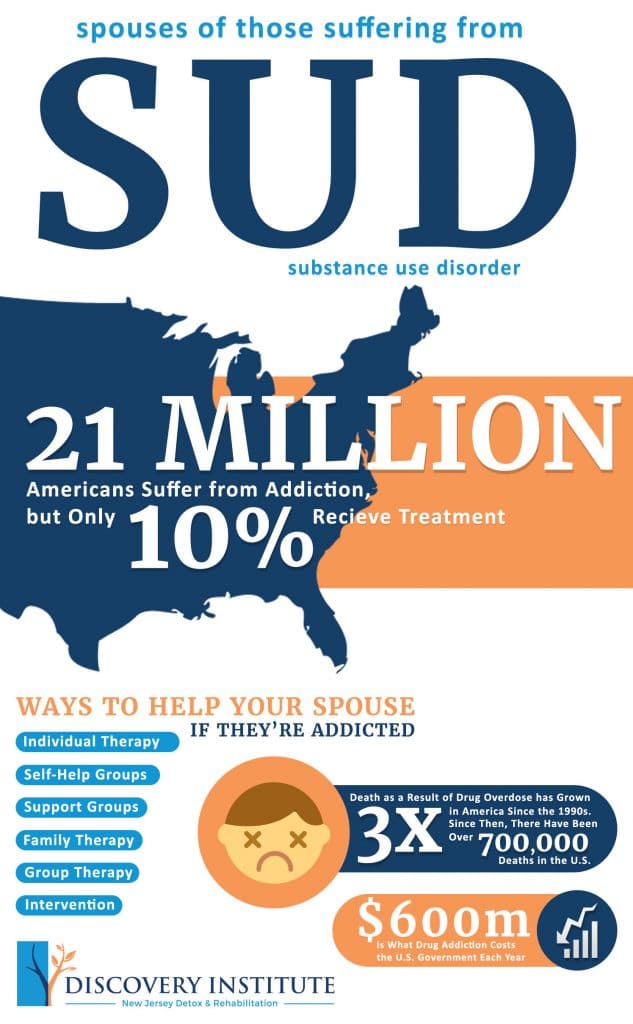Addiction Guides :
For Spouses
This guide for spouses helps you to understand the potential addiction problem in your spouses or partner.
We expect the relationships in our lives to fulfill us and help us grow into better people. Your partner is someone you care about deeply and choose to commit to. The relationships in our lives are crucial to our happiness.
However, some people may find themselves in a difficult situation. If your spouse is suffering from addiction, then that directly affects you too. It’s not easy being married to somebody that is abusing drugs. That’s why we’re here to tell you that you don’t have to go through it alone.
It may be very difficult to see the bright side right now. Even the toughest of situations have a light at the end of the tunnel. Taking action and getting help can restore a broken relationship. Although each circumstance is unique, there are general solutions that can help almost anyone. Keep reading to learn how to navigate being the spouse of an addict.
In 2015, an estimated 27.1 million Americans, age 12 or older, were found using illicit drugs. Out of these nearly 30 million people, imagine how many of those were in relationships. As a spouse of an addict, you may find yourself struggling to feel understood. However, we assure you that you’re not alone.
 There were also 138.3 million Americans aged 12 or older, who reported current use of alcohol in 2015. These numbers portray a major problem. People are struggling and must seek help. It is not realistic to simply ignore the problem and expect it to go away.
There were also 138.3 million Americans aged 12 or older, who reported current use of alcohol in 2015. These numbers portray a major problem. People are struggling and must seek help. It is not realistic to simply ignore the problem and expect it to go away.
No matter how isolated you may feel, we assure you that other spouses of addicts are going through similar challenges. Recognizing these issues and being aware of the problem is the first step.
CONTACT US
Find out how we can help
Our compassionate counselors are standing by to answer any questions you may have. After helping thousands of people over the last 50 years, we have the resources to help you and your family and all your individual needs.
How Substance Misuse Affects Relationships
We expect our partners to be our haven. When substance misuse becomes a problem in the relationship, both people suffer. Substance dependence directly impacts the spouse of a person with an addiction. It’s crucial to understand how addiction affects both parties.
Substance dependence can take a toll on the spouse. A person who suffers from addiction will often suffer from physical symptoms as well as mental ones.
Supporting a Partner Without Enabling
Enabling is when one partner, usually unintentionally, makes it possible for the other to continue drinking or using without having to face the consequences. Oftentimes, the enabler may not even realize what they’re doing. That’s why it helps to keep an eye out for some behaviors that signal enabling.
Examples of enabling behavior may include:
- Allowing a loved one to neglect their responsibilities.
- Letting your spouse abuse you or someone else.
- Making excuses for the individual.
- Neglecting your own needs to help your spouse.
Codependency
Codependency consists of a relationship in which one partner has extreme physical or emotional needs, and the other partner spends most of their time responding to those needs. Consequently, this can lead to the detriment of the codependent partner’s life, activities, and other relationships.
This can lead to a toxic pattern in which the codependent partner cares for and enables the loved one’s challenges. Thus, making it easier for the loved one to continue partaking in destructive behavior.
Types of codependent behavior can include:
- An exaggerated sense of responsibility for the actions of others
- A tendency to confuse love and pity, with the tendency to “love” people they can pity and rescue
- A tendency to do more than their share all of the time/putting in much more effort
- A tendency to become hurt when people don’t recognize their efforts
- An unhealthy dependence on relationships. The co-dependent will do anything to hold on to a relationship to avoid the feeling of abandonment
- An extreme need for approval and recognition
What You Can Do Right Now
If you find yourself feeling stuck, there are actions you can take on your half to alleviate the pain. Being the spouse of an addict is not easy. That’s why self-care is crucial during this challenging time. Fortunately, there are many steps that the spouse can take to help themselves. Some of the many options include:
Being the spouse of an addict can have an emotional and physical toll on you. During a time like this, self-awareness is key. Be honest with how you’ve been taking care of yourself and what kind of emotions you’re feeling. The body and mind are connected so taking care of both is crucial.
Even if you’re a busy bee, you can still implement simple practices into your routine. The goal is to take care of yourself from the inside out. Being married to someone who suffers from addiction usually means that you’re putting your own needs on hold. It’s time to take a timeout for yourself.
The simple habits can include:
- Eating right
- Good sleep hygiene
- Exercise
- Mindfulness
- Attending support groups and therapy
- Hobbies
- Spirituality activities
Setting and enforcing boundaries is a crucial part of being a spouse to an addict. Those who suffer from substance dependence may appear to “test boundaries”. Substance use rewires the brain which leads to toxic behavior in the individual’s life. If your partner is suffering from addiction, make sure to be consistent with your boundaries.
It’s important to support those you love. However, it is not fair for anyone to take advantage of you. Be clear about what you won’t tolerate and the consequences of their actions. When they cross your boundaries, enforce those consequences.
If your spouse is dependent on alcohol or drugs, the blame game may become a common theme. You blame them for their addiction. This results in your spouse blaming you for driving them to alcohol or drug use. There is never a winner in the blame game. All it does is reinforce defensive and toxic behavior. The key is to have productive conversations with the goal of finding a solution to the problem at hand.
When you feel the need to blame your partner, take a pause. The key here is to communicate. Ask supportive questions, such as “How are you feeling right now?” “What can we do to find a solution together that makes us both happy?”
Treatment Options
Fortunately, there are treatment programs available for not just the suffering individual, but the spouse as well. For the person who is dealing with addiction, rehab is a great first step on the road to recovery. Rehab has varying levels of care, depending on  your circumstances and addiction.
your circumstances and addiction.
If your spouse is physically dependent on any substances including alcohol, going through detoxification will be the first step of treatment. It is crucial to rid your body of toxins accumulated through drug use. Withdrawal can be accompanied by unpleasant and possibly fatal side effects, so medical supervision is crucial.
However, withdrawing from substances is only the beginning of recovery. Your spouse will need to learn new coping skills for the stresses of life, develop a support network, and learn to deal with triggers and cravings that may come up in the future. At Discovery Institute, we provide a trigger-free and supportive environment to help your spouse recover from addiction.
Support Groups for the Spouse
According to Project Know, “Recovery for the spouse shares characteristics with the recovery process for an addict, as both depend on acknowledging the problem, learning about the disease that helped create the dysfunction, and adopting new coping skills. Support groups can be instrumental in giving spouses a safe place. Here they can express their fears, find comfort, and discover new ways of interacting with family members.”
Al-Anon Support Groups
Al-Anon is a support group that is available in most locations nationwide. These groups are a fellowship of relatives and friends of alcoholics who share their experience, strength, and hope to solve their common problems. There are also Nar-Anon groups for drug dependence.
These groups meet weekly to provide support for those affected by a loved one who is struggling with addiction. Support groups provide a safe space to healthily cope through negative emotions.
Call Us Today
Being the spouse of an addict is draining and challenging. It is crucial to acknowledge the pain you’re going through. You have the power to learn from the situation and find a solution that helps you, as well as your spouse.
You have complete control over what direction you want your life to go in. There are countless ways to not only maintain sobriety but to improve your life overall.
At Discovery Institute, we’re here to guide you through the entire process. We understand it’s not always easy, but we can promise you that it’ll be worth it.
If you’re the spouse of an addict and ready for lasting and positive change, you can contact us here. You can also call us to talk to one of our experts. Remember, we’re here to answer your questions or address the concerns you may have. We’re waiting for your call!
Dr. Joseph Ranieri D.O. earned his BS in Pharmacy at Temple University School of Pharmacy in 1981 and His Doctorate Degree in Osteopathic Medicine at the Philadelphia College of Osteopathic Medicine in 1991. He is Board Certified by the American Board of Family Medicine and a Diplomate of the American Board of Preventive Medicine Addiction Certification. Dr. Ranieri has lectured extensively to physicians, nurses, counselors and laypeople about the Disease of Addiction throughout New Jersey and Pennsylvania since 2012.



